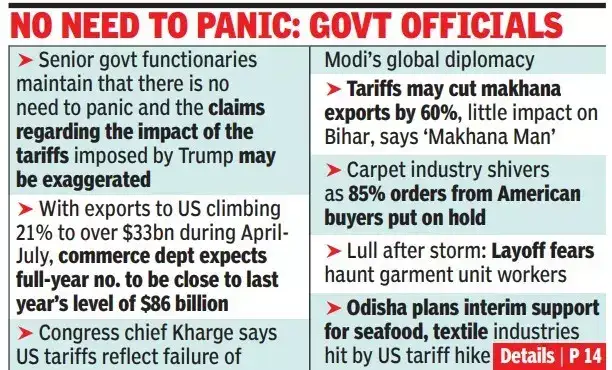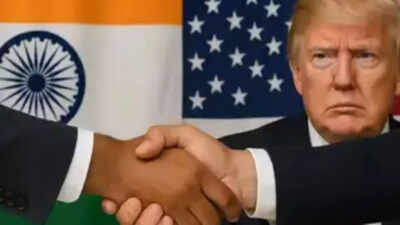NEW DELHI: Hours after the 50% additional tariff on Indian exports to the US kicked in, both countries indicated that they are working towards resolving their differences on the issue with government officials asserting that communication channels remain open.“I think at the end of the day, we will come together,” US treasury secretary Scott Bessent said in a TV interview while stressing that India is the world’s largest democracy and the US is the world’s largest economy.Minutes later, government officials here said that India and the US have a long-term relationship and both will seek to resolve their differences. “Both sides have concerns on how this will play out and both sides are looking to resolve them. Communication channels are open,” the official said.

.
Bessent blamed India’s continuing purchase of Russian crude for being the deal breaker, and also expressed dissatisfaction with the terms proposed by India by dubbing them performative. He said that European countries should also take US-type action against India and expressed frustration over them continuing to source petrol, diesel and aviation fuel, suggesting that a resolution may not be on the cards.But the remark of the treasury secretary, not known for stepping out of line, that the two countries will work their way out of the impasse, was seen as significant.The government here did not appear to be in a mood to relent.Our exports are quite diversified, not so dependent on US market: Officials As the Trump penalties came into force, senior government functionaries maintained that there was no need to panic and the claims regarding the impact of the tariffs imposed by Trump may be exaggerated. “The impact is not as is being projected. Our exports are quite diversified, and we are not so dependent on the US market. There are no large distress signals; industries are not shutting down. Some (manufacturing) units may take a hit, but not the entire sector. We have had challenges in the past, too, and we are hopeful that we have enough resilience to overcome this one,” the official said.With Indian exports to the US climbing 21% to over $33 billion during April-July, the commerce department expects the full-year number to be close to last year’s level of $86 billion. “There is huge growth up to July and we have eight more months to go… it is not as if everything is going to stop. There are also exempted categories such as mobile phones and pharma,” said a source.The officials, however, maintained that India will work within the red lines and seek to protect the interests of farmers, fisherfolk and small businesses, with the US, too, sticking to its stand on Russian oil. Offering lower tariffs on American farm goods, such as corn, soya bean and dairy products, and allowing genetically modified food into the country has been a no-go area for the government.The US has not commented on the issue, after demanding opening up when talks began and are now seen to be stuck. “This is a very complicated relationship. President (Donald) Trump or Prime Minister (Narendra) Modi have very good relationships at that level. And it’s not just over the Russian oil,” Bessent said.According to an agency report, the treasury secretary said that he had thought the trade deal with India would be among the first ones that Washington would sign. “The Indians came in very early after Liberation Day (April 2 when Trump first announced reciprocal tariffs) to start negotiating on tariffs, and we still don’t have a deal,” he said.Bessent added that he had thought that “we would have a deal” with India in May and June. “I thought India could be one of the earlier deals. And they kind of tapped us along in terms of the negotiations. And then there is also the aspect of the Russian crude purchases, which they’ve been profiteering on. So, there are many levels going on here.”He pointed to the trade deficit to suggest that tariff concessions were required for more shipments into India. “I think a lot of it by the Indians has been performative but… I’ve said this all along during the tariff negotiations, the US is the deficit country,” he said.






